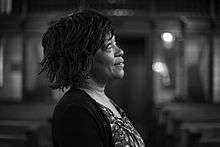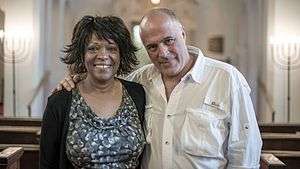Rita Dove: An American Poet
| Rita Dove: An American Poet | |
|---|---|
 Photo by Eduardo Montes-Bradley. Staunton, VA. | |
| Directed by | Eduardo Montes-Bradley |
| Produced by | Heritage Film Project |
| Starring | Rita Dove |
| Music by | Judith Shatin, Franz Peter Schubert, Johann Sebastian Bach |
| Distributed by | Alexander Street Press Filmakers Library, Kanopy |
Release dates |
|
Running time | 50 minutes |
| Country | United States |
| Language | English |
Rita Dove: An American Poet is a documentary film produced, directed and edited by Eduardo Montes-Bradley. It is a biographical sketch of U.S. Poet Laureate and National Medal of Arts winner Rita Dove. The film explores the poet's life beyond the otherwise extensive and readily available information in Internet and Social Media,[1] exposing fundamental facts of Dove's childhood and formative years growing up in Akron, Ohio in the 1950s and during the turbulent 1960s.[2][3]
The film, distributed by Filmakers Library and Alexander Street Press, USA,[4] premiered at The Paramount, on January 31, 2014,[5] presented as a Martin Luther King Day headliner by the Office for Diversity and Equity, Lifetime Learning, Alumni and Parent Engagement and the Department of English, College of Arts and Sciences at the University of Virginia[6] Opening remarks honoring Rita Dove by Boyd Tinsley. Rita Dove: An American Poet was shot in digital format, HD.[7][8]
Synopsis

The film is made of a series of in-depth, on-camera interviews with Poet Laureate Rita Dove—conducted and recorded between September 2012 and October 2013. These interviews were edited with hundreds of still images and several hours of home movies from the Dove family's collection. The intimacy of the dialogue between Rita Dove and Montes-Bradley's camera provide a rare personal insight into the wide range of Dove's artistic passions.[9] Most of these images are the results of the efforts of Rita Dove's father (Ray A. Dove) to record family life in the 1950s and 1960s.[10] Mr. Ray Dove recorded in 8mm and Super 8mm birthdays, the opening of gifts on Christmas Day year after year, holidays and family excursions. According to the filmmaker, "Rita's father is omnipresent and perhaps the silent protagonist of the film as he captured images of Rita which have become fundamental clues to the evolution of the suburban middle class African American child into the celebrated poet we know and recognize."[11]
Rita Dove: An American Poet is structured in eleven parts (chapters): Prologue, nine consecutive "books" - simulating the preference shown by Dove in recent works - and the Epilogue. Each book, numbered with Roman numerals, targets a different aspect in the life and whereabouts of Rita Dove, each of them introduced by the poet reading a poem significant to the theme. Cinematically, these readings are set apart from the core interview by being shot at night and in black & white, although the director continues to approach his subject through a decidedly poetic lens.[12] The themes of the nine film "books" include Childhood in Akron, grandfather Thomas (Thomas and Beulah), Great Migration, Dove's relationship to music (with the cello in particular), her relationship to her father, being non-religious today after growing up "in the bosom of the Church", her encounter with Mexico and the Spanish culture which would eventually prompt her to write "Parsley", one of her most celebrated poems, the segregated beaches of Florida and the Deep South of some of her relatives. The 1963 March on Washington as well as John F. Kennedy's and Martin Luther King's assassinations play an important part in the film and the characterization of its subject. The ninth and last "book" covers the time spent at the University of Tübingen on a Fulbright Scholarship. It is in Germany that Rita Dove comes in contact with a number of issues of great significance in her life and influence on her work. Finally, the epilogue presents itself as a dialogue between poet and film director. Rita Dove: An American Poet concludes in the mid-seventies, right before Rita Dove returns from Europe to the United States to eventually become one of the most celebrated poets of her generation. The final credits are preceded by dedications to Kofi Awoonor and Elisabeth Viebahn.[13]
It uses family photos and home movies to give us snapshots of a lived life. It weaves those together with archival footage, interviews with the author, and passages from her poetry, to achieve its own kind of cinematic lyricism—a visual poetry that pays homage to Dove's own techniques.
— Lawrence A. Garretson - C-Ville Weekly
Filmmaker Eduardo Montes-Bradley's thoughtful and engaging documentary profiles former poet laureate Rita Dove, exploring her life, influences, and formative experiences through on-camera interviews, still images, and home movie clips. And she reflects upon the role of the church in her life, her time in Germany on a Fulbright Scholarship, and an incident in which she and other young poets were invited to meet President Nixon at the White House—only to be turned away. Offering a nicely crafted biographical portrait of a key figure in American literature, this is recommended.
— T. Keogh, Video Librarian. The Video Review Magazine for Libraries. November, 2014.
Filming locations
The principal interview with Rita Dove took place in September 2012 and was conducted at the writer's residence in Charlottesville, Virginia. Additional filming took place in Temple House of Israel and in the streets of Staunton. The inserts of Rita Dove reading were filmed at the director's house near Charlottesville.[14]
Soundtrack
Three composers are credited on the film: Judith Shatin, Franz Peter Schubert, and Johann Sebastian Bach. "Tower of the Eight Winds" Music for violin & Piano by Judith Shatin has the strongest musical presence in the score. Shatin's compositions were performed by The Borup-Ernst Duo and recorded in the label of the American Composers Forum (Innova).[15][16]
Film festivals
- Virginia Film Festival, 2014
References
- ↑ Maurer. David. The Daily Progress. January 31, 2014.
- ↑ Press Release. University of Virginia. February 3, 2014 "Film About Rita Dove Explores the Poet's Formative Years"
- ↑ "JMRL - Crozet". www.jmrl.org. Retrieved 2016-10-18.
- ↑ Filmakers Library, an imprint of Alexander Street Press. Official Website.
- ↑ YouTube broadcast of the opening night including printed programs, street scenes, and principal speaker Boyd Tinsley Video on YouTube
- ↑ Bromley, Anne E. Rita Dove, Michael Eric Dyson Headline U.Va.'s 2014 MLK Commemoration | UVA Today | Charlottesville, VA | January 10, 2014.
- ↑ Bromley, Anne E. "Film About Rita Dove Explores the Poet's Formative Years" UVA Today, February 3, 2014
- ↑ Black Graduate & Professional Student Organization at the University of Virginia (BGPSO)
- ↑ Heritage Film Project Website
- ↑ Community Martin Luther King Celebration | University of Virginia
- ↑ Dr. Martin, Marcus. Opening speech during the premiere of the film.
- ↑ Garretson, Lawrence A. "Rita Dove talks about a new film on her life and work”. C-Ville Weekly, January 29, 2914.
- ↑ Rita Dove: An American Poet at the Internet Movie Database
- ↑ Final Film Credits
- ↑ Musical America Worldwide. Press Release. January 28, 2014
- ↑ Sequenza 21/ The Contemporary Classical Music Community
External links
- The Paramount
- Rita Dove: An American Poet at the Internet Movie Database
- Producer's Official Site
- Vimeo Trailer